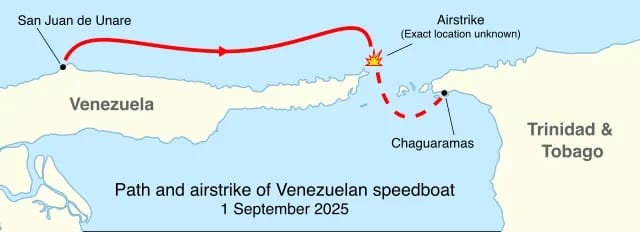Donald Trump, in a show of manliness, has taken to ordering the destruction of so-called drug vessels leaving Venezuela. He orders our Navy to blow up the ships, then posts the video on social media as if he were playing a video game. He offers no proof that these vessels were indeed carrying drugs. When the Navy or Coast Guard interdicts boats believed to be running drugs, they’re mistaken about 25% of the time, according to Republican Senator Rand Paul.
The United States has destroyed several vessels, killing all the men aboard, labeling them narco-terrorists with no evidence. America has yet to identify any of the men killed, with Trump making the bizarre claim that every vessel destroyed saves 25,000 American lives.
In 2022, the peak year for American drug overdoses, approximately 110,900 deaths occurred. For the most recent 12-month period recorded, ending March 31, 2025, 77,600 people died. Given that Trump has destroyed six vessels between September 1, 2025, and October 19, 2025, that would mean the president has saved 150,000 lives, which is more than the annual death toll and more surprising since Venezuela provides a small fraction of the drugs supplied to America. The path of the first vessel destroyed (see cover photo) shows it headed away from the United States.
I suppose it was bound to happen, the last vessel destroyed was a “drug-carrying submarine,” but there were two survivors. On October 17, 2025, U.S. forces carried out an airstrike against a semi‑submersible vessel in the Caribbean Sea. The Trump administration claimed the vessel was “loaded with fentanyl and other narcotics” and heading toward the United States. Four people were on board. Two were killed instantly, while two survived the attack.
U.S. forces rescued the survivors after the vessel was destroyed. They were identified as nationals of Ecuador and Colombia. This was the first time in the series of six strikes that there were survivors taken into custody. Trump announced that the survivors would be repatriated to their home countries “for detention and prosecution.” He referred to them as “terrorists” in his social media posts.
I knew we were never going to hear from the survivors once their rescue was announced. Heaven forbid they turned out not to be carrying fentanyl or other drugs or headed to a location that wasn't the United States. The names of those attacked are known; how else could they be identified as nationals of Colombia and Ecuador?
The very least that should happen is that Congress should hold hearings, demanding the identities of the two men and proof they were involved in drug trafficking.
In the end, the fate of the two men pulled from the wreckage is less about their individual stories than about what their survival exposes. By choosing repatriation over due process, the administration sidestepped legal scrutiny at home while deepening international unease abroad. The strikes, framed as victories in a war on “narcoterrorists,” have left behind unanswered questions about evidence, legality, and the human cost of executive power exercised at sea. Their survival is a reminder that even in a campaign built on spectacle and absolutes, the truth is harder to sink — and the reckoning for how far a president can go in the name of security is still to come.
This post originally appeared on Medium and is edited and republished with author's permission. Read more of William Spivey's work on Medium. And if you dig his words, buy the man a coffee.
